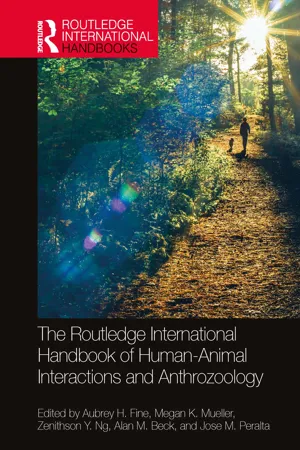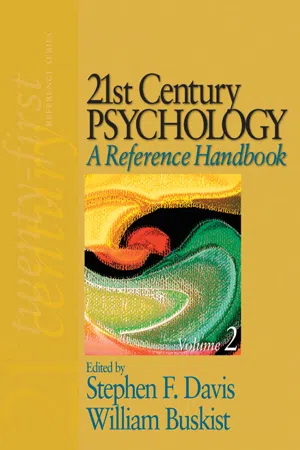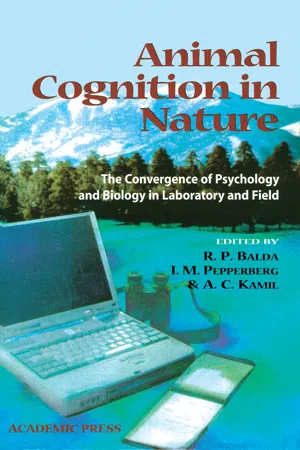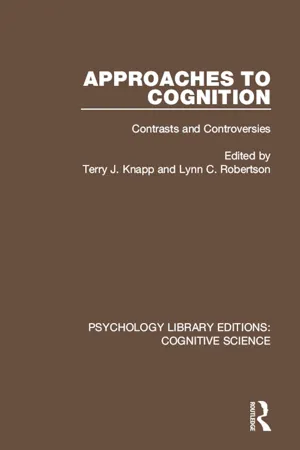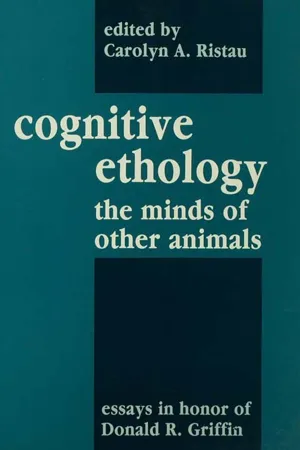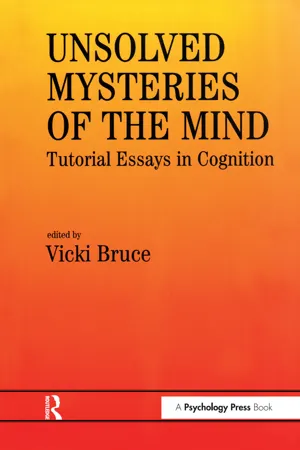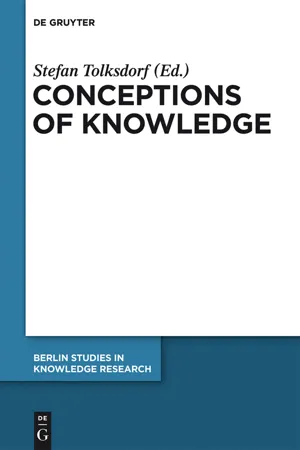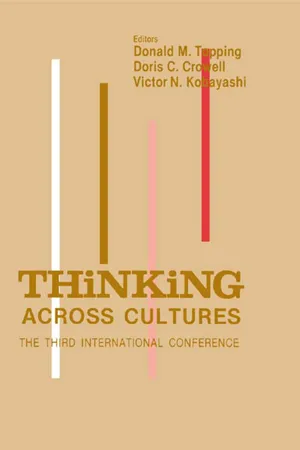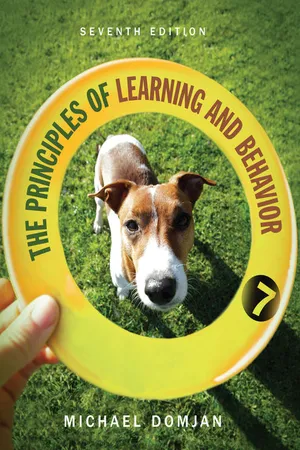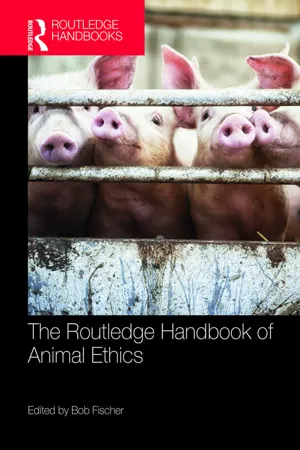Psychology
Animal Cognition
Animal cognition refers to the mental processes and abilities of non-human animals, including perception, learning, memory, problem-solving, and communication. It encompasses the study of how animals acquire, process, store, and act on information from their environment. Researchers in this field seek to understand the cognitive capacities of different species and how they compare to human cognition.
Written by Perlego with AI-assistance
Related key terms
1 of 5
12 Key excerpts on "Animal Cognition"
- Aubrey H. Fine, Megan K. Mueller, Zenithson Y. Ng, Alan M. Beck, Jose M. Peralta, Aubrey H. Fine, Megan K. Mueller, Zenithson Y. Ng, Alan M. Beck, Jose M. Peralta(Authors)
- 2023(Publication Date)
- Routledge(Publisher)
11 Animal Cognition Lena ProvoostDOI: 10.4324/9781032153346-11Introduction to Animal Cognition
Cognition is defined as the mental processes utilized to gain knowledge and understanding through sense, experience, and thought. The fascinating field of comparative psychology investigates similarities and differences between human and animal behavior, while comparative cognition focuses on the biological mechanisms driving behavior. Studies in Animal Cognition ask what type of knowledge a species learns, how, and why. The answers to these questions and their driving factors can contribute to improved welfare in various aspects of animal management systems, therapeutics, and training. Cognition studies continue to focus on non-human primates (NHP), rats, pigeons, other bird types, and dogs (Beran et al., 2014 ). However, there are studies, though not as in-depth, on insects (Perry et al., 2017 ), cats (Vitale et al., 2015), horses (Matsuzawa et al., 2017 ), dolphins (Herman et al., 1989 ), and sea lions (Kastak et al., 1994 ).Cognition is classified as either social or non-social. Non-social cognition investigates perceptual abilities, attention, learning, memory, and executive function (Tulsky et al., 2003 ). While social cognition explores the way in which individuals adapt and interact with conspecifics, as well as other species, some consider this emotional intelligence (Brabec et al., 2012 ). Not surprising, current literature suggests overlap in social and non-social cognition due to shared neural circuits (Rodriguez-Rajo et al., 2020).Historical Perspectives
Charles Darwin spurred the research of the parallels between human, animal emotion, and cognitive abilities (1872). In 1882, George Romanes , a friend of Darwin and naturalist, began reporting on cognitive abilities in animals, from scorpions to elephants; however, he was known to anthropomorphize his findings. In 1913, the psychologist John Watson- Stephen F. Davis, William Buskist, Stephen F. Davis, William F. Buskist(Authors)
- 2007(Publication Date)
- SAGE Publications, Inc(Publisher)
285 31 A NIMAL C OGNITION B RADLEY R. S TURZ Armstrong Atlantic State University K ENT B ODILY , M ICHELLE H ERNÁNDEZ , K ELLY S CHMIDTKE , AND J EFFREY S. K ATZ Auburn University A nimal cognition refers to the mechanisms by which nonhuman animals process information and is primarily concerned with understanding how animals learn, store, remember, and respond to information from the environment. Although similar in many respects to the present-day fields of animal learning, behavioral ecology, and ethology, Animal Cognition has emerged as a distinct area of study by adopting the infor-mation-processing perspective from human cognitive psy-chology. The information-processing perspective assumes that animals form and manipulate internal representations about their environment. As such processes afford flexibil-ity and adaptability in behavior necessary for survival in an ever-changing environment, the information-processing perspective has proved useful in explaining and predicting numerous behavioral phenomena in animals. Historically, Animal Cognition finds its roots in the American tradition of animal learning (e.g., Edward Lee Thorndike) and the European tradition of ethology (e.g., Konrad Lorenz, Niko Tinbergen). Each tradition differs in approach and method of investigation. Whereas etholo-gists often stress adaptive specializations and focus their studies in the context of an animal’s natural environment, those studying animal learning often stress general pro-cesses and focus their studies in the context of a labora-tory. Despite the rich historical roots in these traditions, Animal Cognition did not emerge as a distinct field of study until shortly after the cognitive revolution of the 1960s. It was then that the information-processing perspective was infused into the fields of animal learning and ethology. Since that time, Animal Cognition continues to mirror its human counterpart in focus and theory while maintain-ing an interest in learning and behavior.- eBook - ePub
Genes and Behaviour
Beyond Nature-Nurture
- David J. Hosken, John Hunt, Nina Wedell, David J. Hosken, John Hunt, Nina Wedell(Authors)
- 2019(Publication Date)
- Wiley(Publisher)
While we now may scoff at Jensen's naïveté, researchers often continue to rank animals' cognitive performance based on the extent to which they match humans' achievements. There also remains a residual assumption that animal behaviour is predominantly instinctive, or at most controlled by primitive learning processes, in contrast to the rational decision making thought to underlie human behaviour. However, the history of the field of comparative cognition reads as a litany of the demise of supposedly uniquely human traits: tool manufacture, teaching, imitation, episodic memory, theory of mind, and so on (Goodall 1986 ; Thornton and McAuliffe 2006 ; Whiten et al. 1996 ; Clayton and Dickinson 1998 ; Krupenye et al. 2016). In this chapter we will probe the nature of the animal mind. We will begin by considering the evidence that cognition evolves and is shaped by genetic inheritance. We then turn our attention to the ways in which experiences throughout development shape animal minds. Finally, we consider the interplay between nature and nurture. Research in comparative cognition lags far behind other areas of biology in our understanding of gene by environment interactions, but recent developments offer some promise that we may at last begin to move away from asking whether geniuses are born or made. 9.1 Cognition Evolves While psychologists commonly use rather restrictive and anthropocentric definitions of cognition, animal behaviour researchers tend to favour Shettleworth's (2010) broader conception of cognition as all the neural processes involved in acquiring, processing, storing and using information to guide decisions. At its core, cognition involves neuronal processing to reduce informational uncertainty. This allows individuals to track statistical regularities in the environment and modify their behaviour in response to changing conditions - eBook - PDF
Animal Cognition in Nature
The Convergence of Psychology and Biology in Laboratory and Field
- Russell P. Balda, Irene M. Pepperberg, A. C. Kamil(Authors)
- 1998(Publication Date)
- Academic Press(Publisher)
Animal Cognition IN NATURE Copyright © 1998 Academic Press ISBN 0-12-077030-X All rights of reproduction in any form reserved 436 Animal Cognition in Nature So I shall conduct a sort of Cook's tour of areas bordering on the ethological approaches to cognition. Although the ethological perspective penetrates into some of these areas, there are regions where the language sounds quite foreign, and the customs seem quite strange. I begin with some famihar territory, historical landmarks in the study of Animal Cognition, as a reminder of our joint origin. Some nineteenth-century ideas about Animal Cognition Current approaches to Animal Cognition can all trace their ancestry back to Darwin's evolutionary perspective in The Origin of Species (1859) and The Descent of Man (1871). In the latter volume, Darwin laid the foundation for regarding nonhuman creatures as cognitively endowed. He wrote at length about the mental powers of animals, including curiosity, attention, imagina-tion, reason, abstraction and self-consciousness. Michael Ghiselin (1969) has argued that most of Darwin's writing in this anthropomorphic vein was merely metaphorical, but this reading cannot be sustained where Darwin was expressly seeking to establish continuities between animal and human mental capacities. Continuity between human and animal minds offers a two-way street: contemplation of animals in human terms, or of humans in animal terms. As Donald Broadbent (1961) has put it, 'you could either humanize the brutes or brutalize humans'. Darwin's immediate successors took the first option. His younger colleague, George Romanes, is notorious for using anecdotal evidence to argue anthropomorphic conclusions. - eBook - ePub
Approaches to Cognition
Contrasts and Controversies
- Terry J. Knapp, Lynn C. Robertson(Authors)
- 2016(Publication Date)
- Routledge(Publisher)
Finally, only a comparative analysis will inform us of the evolutionary history of cognitive processes. Although this is not now a central issue in cognition, it is clear that knowledge of which types of processes are primitive, which are recent developments, and which are unique specializations will make our understanding of Animal Cognition more complete. Gathering such knowledge is a complex task, but methods have been developed to discover the evolutionary history of certain behaviors (e.g., Greene, 1978). Similar methodology could conceivably be applied to the study of the evolution of cognitive processes. An example of this general approach is the study of animal communication to better understand the evolution of human language (cf. Parker & Gibson, 1979). In attempting to analyze the similarities and differences between nonhuman and human communication systems, the definition and necessary attributes of language have become more precise. Eventually, this analysis may reveal which attributes of human language are relatively primitive (i.e., are shared with the common ancestor of humans and whichever species also exhibit this attribute) and which attributes are unique specializations of our species.SUMMARYWe have examined the history of ideas about Animal Cognition, illustrated their current state, and suggested some potential roles that the field might have in the future of psychology. We have also addressed the criticisms that have been made of the cognitive enterprise. The modern study of Animal Cognition has shifted from an interest in the explanation of molar behavior that characterized it earlier in this century to the use of behavioral tests to evaluate hypotheses about the nature of internal processes. In this respect, the modern enterprise is borrowing methods and concepts from the field of human information processing (cf. Blackman, 1983; Riley & Leith, 1976). It is clear that the cognitive processes that have been inferred are meant as descriptions of causal factors that are properties of the functional organization of the nervous system. These hypothesized mechanisms have predictive power in situations where historical analyses have difficulty predicting behavior. Finally, we have described how the study of cognitive processes is enriched by consideration of their function and argued for a more ecological approach to the study of cognition. - eBook - ePub
Cognitive Ethology
Essays in Honor of Donald R. Griffin
- Peter Marler, Carolyn A. Ristau, Peter Marler, Carolyn A. Ristau(Authors)
- 2013(Publication Date)
- Psychology Press(Publisher)
Cognition and conscious thinking by nonhuman animals present a variety of exciting and significant research challenges for scientists concerned with animal behavior. The extent to which animals think about what they are doing and about the behavioral choices they make is a highly significant attribute that must be understood before we can fully appreciate what it is like to be a certain type of animal. We don't yet know much about this subject, and until quite recently we have been reluctant even to think about it, let alone study it. This is changing, however, and the number of papers devoted to cognitive ethology at the 1987 meeting of the Animal Behavior Society reflected this rekindling of interest. Animal Cognition is now a recognized scientific subject, and several books and symposia have recently been devoted to this topic (e.g., Griffin, 1984; Roitblat, 1987; Roitblat, Bever, & Terrace, 1984; Walker, 1983).Many students of animal behavior are concerned not only with what animals do, but also with the cognitive processes within their central nervous systems that interact with sensory information to produce the observed behavior. Nevertheless, many of us still hesitate to consider the possibility that some Animal Cognition may also entail conscious awareness on the animal's part. Contemporary behavioral scientists tend to limit their investigations of Animal Cognition to patterns of information processing within the central nervous systems of the animals they study and ignore the possibility that subjective mental experiences may occur and may influence behavior. This reluctance to consider subjective mental experiences, so clearly expressed by Yoerg and Kamil in this volume, may result, in part, from unrecognized vestiges of behaviorism that inhibit inquiry – even when we believe we have recovered from the negative dogmatism of strict behaviorism. We tend to find the notion of conscious awareness disturbing and struggle to find ways of analyzing animal behavior without allowing what seem like subversive notions of subjectivity to get a foot in the door. But Radner and Radner (1989) have recently explained how insubstantial a philosophical basis underlies this widespread antipathy to animal consciousness among behavioral scientists. Cognitive ethology should certainly include, but not be limited to, information processing in animal brains. - eBook - ePub
Unsolved Mysteries of The Mind
Tutorial Essays In Cognition
- Vicki Bruce(Author)
- 2021(Publication Date)
- Psychology Press(Publisher)
This divergence between lay and technical views of the world should alert us to a potential problem. Is there indeed something there, which the everyday dog owner takes for granted, but the psychologist, whether working with animal subjects or human participants, refuses to see? We should not be too hasty, in an excess of academic humility, to discard the specialist point of view. Both the behaviourist and the human cognitive psychologist are responding to real problems. Lloyd Morgan’s objective analyses, for example of his dog’s acquisition of the habit of opening a gate (Morgan, 1894, p.289) cast into very real doubt the naive mentalism of many anecdotal accounts of “animal intelligence”, such as Romanes (1886) had collected. From the other direction, early cognitive psychologists from Bartlett (1932, pp.214–5) onwards had to emphasise that human cognition involved processes that were never going to be touched by the dominant behaviourist approach to learning (see also Bruner, 1990, pp.2–4). Given the long association of behaviourism with experiments on animal learning, and the all-pervading influence of human language on human cognition, it is hardly surprising that cognitive psychology perceived a gulf between human and animal cognitive processes so deep as to override the basic Darwinian continuity between humans and other animals.However, in the last quarter-century, the emergence of cognitive psychology as a distinct discipline has led to a new approach to many questions in animal behaviour, and the idea of studying “Animal Cognition” (rather than, say, “learning”) is now firmly established. There remains much controversy on whether the study of Animal Cognition leads to an acceptance of what Griffin (1978) called “cognitive ethology”. Nonetheless, given a thriving animal cognitive psychology, it makes sense to look again at the disjunction between lay and psychological approaches to animal thinking, and ask again, “Can animals think?” We are not, of course, claiming to be the first to have raised the question of animal thought in recent times. Important sources for our argument include ethologists (e.g. Cheney & Seyfarth, 1990; Griffin, 1978, 1984), psychologists (e.g. Pearce, 1987; Walker, 1983) and philosophers (e.g. Dennett, 1988, 1991; Radner & Radner, 1989). A useful recent and thorough survey is the book edited by Ristau (1991). The aim of this chapter is to review the different ideas that have been brought forward, and to argue that a consensus has now been found.When we talk about “animals” in this chapter we really mean warmblooded vertebrates (other than humans, to avoid endless circumlocution). That is not to rule out the possibility that reptiles, or even some invertebrates such as certain molluscs, might be able to think. But as it is in question whether any - eBook - PDF
- Stefan Tolksdorf(Author)
- 2011(Publication Date)
- De Gruyter(Publisher)
That non-human animals sometimes know things in ways different than we do does not entail that they do not know things at all; indeed, of course, quite the opposite is true. There are important issues at stake in the cognitive ethology litera-ture about the manner in which non-human animals come to form be-liefs about their environment, and there is a good deal of controversy as to exactly what the content of their beliefs is. But there is a well estab-lished research program which involves attributing beliefs and desires to animals and explains their behavior on the basis of those mental states, and one should not suppose, as Shettleworth does, that this involves any sort of error at all. While ethologists have spent a good deal of time arguing that the proper explanation of animal behavior requires attributing intentional states such as beliefs and desires to animals, it is interesting to note that, once this move has been made, ethologists begin, almost immedi-ately to speak of animal knowledge. Consider, for example, the follow-ing passage from Michael Tomasello and Josep Call’s Primate Cognition: In the physical domain, virtually all species studied have demonstrated a basic knowledge of permanent objects and some of the ways they may be related to one another spatially, quantitatively, and in terms of their per-ceptual similarities. In the social domain, virtually all species studied have demonstrated a recognition of individual groupmates and a knowledge of some of the important ways they may be related to one another socially 11 Cf. esp., Povinelli/Eddy (1996), 16. Epistemology and Cognitive Ethology 547 and behaviorally. In both domains individuals have demonstrated the ability to use this knowledge to formulate various types of strategies, ranging from efficient foraging and tool use to coalition strategies and social learning, that help them attain goals with respect to such basic adaptive functions as feed-ing and mating. - eBook - ePub
Thinking Across Cultures
The Third International Conference on Thinking
- Donald M. Topping, Doris C. Crowell, Victor N. Kobayashi(Authors)
- 2013(Publication Date)
- Routledge(Publisher)
Disagreements over the conceptualization of mind and thinking remain. Pylyshyn (1984), for example, argues for a demarcation between those brain processes that are the basis of cognitive processes and those that are subcognitive. Cognitive processes are those that are cognitively penetrable, that is, those that can be influenced by beliefs, desires, intentions, and so forth. Similarly, Gallup (e.g., 1970, 1979) argues a position reminiscent of those of Sechenov and other mechanists, that only animals that have self-awareness, as shown by a particular test, have minds. In his test, the animal is anesthetized and a mark is placed on the animal's face. When the animal recovers from anesthesia it is allowed to look in a mirror. Only those animals that recognize themselves in the mirror, and attempt to touch the paint, are said to have mind (cf. Epstein, Lanza, & Skinner, 1981). Obviously, the definition of mind or of thinking one adopts has a tremendous impact on how one interprets data concerning the presence or absence of mind.A working definition of mind
Roitblat (1987a, 1987b) offered a working definition of mind that was in keeping with the modern computational information-processing approach of general psychology. Mind is the set of cognitive structures, processes, skills, and representations that intervene between experience and behavior. Thinking is the processing of information and the employment of cognitive skills. Consciousness is the set of cognitive processes that refer to the organism's other cognitive processes. In a sense it is thinking about thinking.This working definition is general and admits to many alternative conceptualizations of the animals one is studying. For example, harking back to Morgan and behaviorism, the tradition in comparative psychology has been to interpret animal behavior according to the simplest possible mechanisms. There is great scientific virtue in a parsimonious conceptual approach, but there also are inherent dangers. Two dangers are especially relevant in the present context: the danger of stupid explanation and the danger of mistaking description for explanation . The simplest explanation of a behavior is usually taken to be a reflex-like stimulus-response (S-R) connection. Any behavior can be described as changes in response patterns in the face of repeated presentations of a situation (i.e., as changes in S-R relations). Hence, any behavior, at least any individual behavior, can be described and interpreted in S-R terms. These descriptions and interpretations, however, are often mistaken for explanations—for arguments that the mechanisms that produce those behaviors operate according to S-R principles, when in fact the mechanism may be quite different. In short, it is relatively easy to make any individual behavior look stupid, depending on the level of description one adopts. Furthermore, although individual behaviors can always be described in S-R terms (at least post-hoc), organisms are not simply the sum of individual behaviors. Instead, the comparative psychologist's task is to explain the organism's behavioral repertoire. When considered in toto - No longer available |Learn more
- Michael Domjan(Author)
- 2020(Publication Date)
- Cengage Learning EMEA(Publisher)
A highly influential criterion was offered by George Romanes in his book Animal Intelligence (Romanes, 1882). Romanes proposed that intelligence be identified by whether an animal learns FIGURE 1.4 Charles Darwin (1809–1882) Philip Gendreau/Bettmann/CORBIS 10 Chapter 1: Background and Rationale for the Study of Learning and Behavior Copyright 2013 Cengage Learning. All Rights Reserved. May not be copied, scanned, or duplicated, in whole or in part. Due to electronic rights, some third party content may be suppressed from the eBook and/or eChapter(s). Editorial review has deemed that any suppressed content does not materially affect the overall learning experience. Cengage Learning reserves the right to remove additional content at any time if subsequent rights restrictions require it. “to make new adjustments, or to modify old ones, in accordance with the results of its own individual experience” (p. 4). Thus, Romanes defined intelligence in terms of the ability to learn. This definition was widely accepted by early comparative psychologists and served to make the study of animal learning the key to obtaining information about the evolution of intelligence. As the upcoming chapters will show, much research on mechanisms of animal learning has not been concerned with trying to obtain evidence of the evolution of intel- ligence. Nevertheless, the cognitive abilities of nonhuman animals continue to fascinate both the lay public and the scientific community. In contemporary science, these issues are covered under the topic of “comparative cognition” or “comparative psychology” (e.g., Papini, 2008; Shettleworth, 2010). Studies of comparative cognition examine topics such as perception, attention, spatial representation, memory, problem solving, categori- zation, tool use, and counting in nonhuman animals (Zentall & Wasserman, 2012). - eBook - PDF
- Russell Powell, P. Honey, Diane Symbaluk, , Russell Powell, P. Honey, Diane Symbaluk(Authors)
- 2016(Publication Date)
- Cengage Learning EMEA(Publisher)
In this chapter, we will explore this topic in more detail by examining evidence from the field of research known as compara-tive cognition. Comparative cognition is the study of information processing across a variety of species, including humans. As noted in Chapter 1, com-parative cognition is becoming an increasingly popular research area among many behaviorists these days, with research being conducted on such topics as memory, categorization, decision making, problem solving, and even com-plex processes like language use and deception. The term “ comparative ” refers to the practice of comparing such abilities across species to determine whether their skills are similar or different. This area is sometimes also called “ cognitive behaviorism ” or “ Animal Cognition, ” but many researchers prefer the term “ comparative cognition ” because it recognizes that comparison is key to understanding a species ’ abilities. It also acknowledges that even when we study the cognitive abilities of just one species, we are often com-paring that species to our own. 1 Within comparative psychology, Tinbergen ’ s “ four questions ” or “ four levels of analysis ” (Tinbergen, 1963) are traditionally used to categorize research findings (see Figure 13.1). The first two questions deal with the ultimate cause of a trait, which refers to the reasons for which that trait evolved within a species , while the last two questions deal with the proximate cause of a trait, which refers to the more immediate causes for the expression of that trait in an individual ( “ proximate ” means nearer or more immediate). Listed below are Tinbergen ’ s four questions, with the example of taste aversion learning included to help illustrate their meaning. 1 As mentioned in Chapter 1, not all behaviorists agree with the growing popularity of cognitive explanations of behavior. They contend that noncognitive interpretations are in many cases equally viable. - eBook - ePub
- Bob Fischer(Author)
- 2019(Publication Date)
- Routledge(Publisher)
This practice, in turn, has consequences for ascriptions of moral considerations toward animals. For example, Bermúdez (2007) argues that, when understanding Animal Cognition, we must distinguish between animals whose behavior can only be explained through psychological explanations and animals whose behavior can be explained through nonpsychological forms of explanation, that is, explanations that appeal to a mechanism of associative conditioning. He argues that this distinction can be used to “mark” a morally significant line. Moreover, with animals whose behavior can be explained through psychological explanations, it is necessary to distinguish between propositional and nonpropostional thought and the ability to have higher-order thoughts that are language-dependent. As such, Bermudez concludes, any ethical theory must account for these subtle distinctions among different nonlinguistic creatures.This interpretation of Morgan’s Canon, equating complex cognitive capacities with uniquely human capacities, has been criticized by several authors who argue that in assuming that cognitive process is uniquely human, this interpretation begs the question (Andrews 2015; Allen and Bekoff 2007). Buckner (2013) argues that researchers who adopt the canon in this way have engaged in what he calls anthropofabulations: unrealistic idealizations of human abilities that set the comparative bar for animals unreasonably high. According to Buckner, researchers fall for these anthrofabulations
Index pages curate the most relevant extracts from our library of academic textbooks. They’ve been created using an in-house natural language model (NLM), each adding context and meaning to key research topics.
